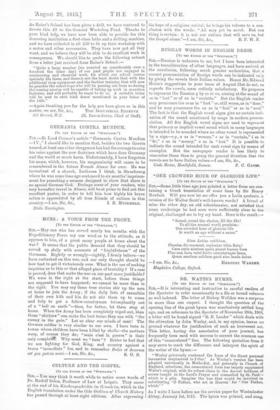RUSSIAN WORDS IN ENGLISH DRESS.
[To THE EDITOR OF Tina "SPRCTATOR:] Sin,—Russian is unknown to me, but I have been interested in the transliteration of other languages, and have arrived at the conclusion, following much greater authorities, that it correct pronunciation of foreign words can be indicated only by giving the vowels their Italian values. Hence Mr. Edward Raise's suggestions in your issue of August 21st do not, as regards the vowels, seem entirely satisfactory. He proposes to represent the Russian y by oo or ou, alining at the sound of oo in "loot" or of ou in "roulette." But the English reader may pronounce the oo as in " foot " or, still worse, as in "door," and he may pronounce the ou as in "foul" or as in "soul." The fact is that the English vowel signs give no certain indi- cation of the sound sanctioned by usage in modern pronun- ciation. All five English vowel signs are used to represent that primary or implicit vowel sound which in many languages is intended to be sounded where no other vowel is represented by a sign—e.g., a as in "woman," e as in "certain," i as in "fir," o as in "money," u as in "hut." It is possible to indicate the sound intended for each vowel sign by means of examples. But the newspaper reader is less likely to remember these than to grasp the general direction that the vowels are to have Italian values.—I am, Sir, &e., Cade Hots°, Heathfield, Sussex. F. 0. GAM.


































 Previous page
Previous page